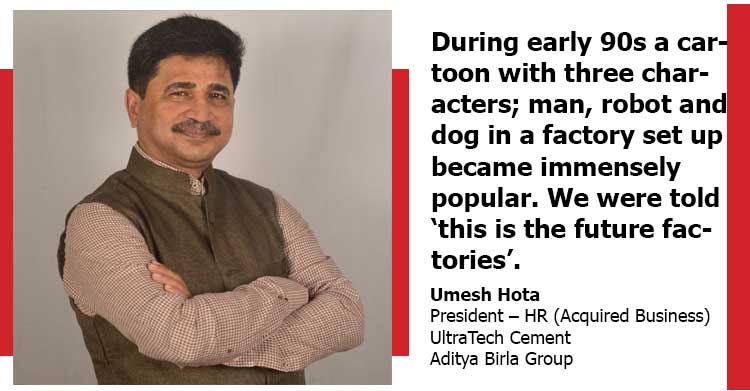AI ENABLING CULTURE | Umesh Hota | President – HR (Acquired Business) | UltraTech Cement | Aditya Birla Group

AI ENABLING CULTURE
During early 90s a cartoon with three characters; man, robot and dog in a factory set up became immensely popular. We were told ‘this is the future factories’. You will need robots to do all work, one man to ensure no breakdown of robots….if machines break down in any case robot will sense and repair. The dog is to ensure that man does not sleep. The essence is that robots will replace man completely. Man is required only to make, break, improvise, repair, and use robots. That’s the only skill required! I used to wonder as a HR professional what would I do? How long will my job survive?
Has it happened? Certainly not. But robots have taken up jobs which earlier humans were doing. Many of it were risky, difficult to do and some impossible. Robots have supplemented human efforts by enabling, enhancing the skill and abilities; at times replaced as well. But has not gone to the extent it was predicted. Today employees are not scared of being pushed to the realm of insignificance by robots.
Same is the apprehension today about AI invading our workplace and replacing ourselves. This has most certainly created some amount of apprehension, skepticism, insecurity resulting into resistance to AI.
NURTURING A PRO AI CULTURE
For many progressive organisations, a number of business processes are today aided, supported or taken over by AI. The deadly Covid speeded up the infusion of AI in to our professional and personal life.
Have we been able to leverage the best out of the technology that we have selected? Or the processes we have enabled with AI. The answer is not a clear and resounding ‘yes’!
Selection of the latest or the most intelligent technology, the most advanced platform and hiring of the best of minds have been the focus for many. Complacency out of budget sanctioned has made us ignore the overarching factor called ‘culture’!
Any new intervention, howsoever well-conceived it is, needs a supportive culture which makes if flourish and AI is no exception. It’s the organisation’s outlook and openness to embrace a new system or lack of it will be the most decisive factor to make AI survive, deliver the desired result or get rejected and die.
The belief that all repetitive processes will be taken over by machines with artificial intelligence is a limited view in today’s context. There are organisations which are using AI rich processes for selection, training and even coaching & mentoring! It has moved beyond answering employees’ query on policy related matters where everything can be precisely pre-defined.
Accepting that usage of AI for running intense business process including customer and employee services is not a choice anymore, the leadership of the organisation should assess their culture and nurture one that is inclined to welcome AI and facilitate its use and continuous development.
Addressing skepticism becomes essential specially if in the past any new initiative did not give desired result, took longer than expected to be implemented or had to be aborted due to lack of acceptance by employees. Recall the kind of protest we had to face from banking and government department employees when computerization was introduced.
The reason for such resistance could be adaptability challenge, fear of redundancy, reduced value of individual contribution, or even job loss. Instead of pushing implementation of AI down the throat on the ground of essential organizational requirement, the leaders need to demonstrate patience and pace it appropriately or even postpone for a brief period. Invest in preparing the employees by making them understand what it is, how does it work, the benefit it is expected to deliver to the employees / organisation, how would it enrich their own work. The best thing to do is to share real life experiences of similar organisations, send few to another workplace to experience first-hand.
A good degree of training and education on the way it works, the power of AI will help reducing resistance.
Is your organisation culture inclined towards delegation? Or the leaders believe in centralization? AI enabled process or device is to be treated as a personality(Sophia getting citizenship), a role holder who delivers what an individual or a group of employees used to deliver. To make this personality successful, certain jobs needs to get delegated to it. Higher the intelligence of the AI, more independent it will be, wider will be its responsibility, it will demonstrate higher degree of learning agility. An organisation where leaders do not believe or encourage decision making at a lower level of the hierarchy the probability of AI failing is high.
Pilot testing in a limited sphere or assigning activities of lower significance to start with may help to build confidence. Today for many activities like lodging a service request for your washing machine, customers prefer chatbot rather than call a number starting with 1800- and waste time.
Do your employees take decision basis logic, subjective rational, hunch or is the decision making process data centric? AI enables decision making by supplementing with great deal of relevant data or decides using available data picked up from various sources. Availability of data, respect for the decision made basis outcome of various analysis are key requirements. One way to facilitate it is to hire talent with these competency, support them and create success stories. Demonstrate the difference and talk about it in important platform. The top leadership team have to experience it, welcome it and gradually learn to live with it. This will help AI making its inroad slowly. The final decision is taken by humans, it’s ‘and’ not ‘or’. The changes in such an organisation have to be incremental but consistent.
Journey of introduction of AI and allowing it to take over the identified business processes will be a mix of successes and failures. Like any change initiative, patience and perseverance are the key requirement!



Very good article …